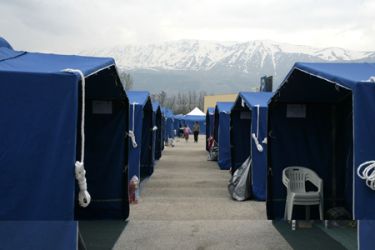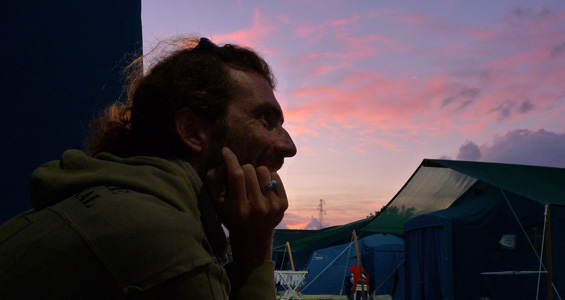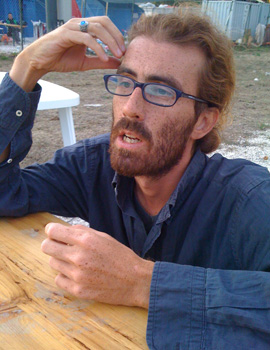
Filmmaker Q&A: From Zero
When the international media left an Italian disaster area, Italian filmmakers stepped in.
 |
| Documentary-maker Stefano Strocchi lives in one of the tent camps |
When an earthquake hit central Italy in April, Italian filmmaker Stefano Strocchi found himself asking what happens in a disaster area when the international media has left.
From Zero: Ask the dust, a film about an internet documentary series which follows everyday life in an emergency tent camp in Abruzzi, Italy, was born from that question.
In this interview with Witness’ Asim Haneef, Stefano Strocchi discusses the making of the documentary series.
Al Jazeera: How did you come up with the idea for this project?
Stefano Strocchi: Since the discovery of the wonderful project ‘Gaza-Sderot’ I became fascinated by the idea of combining the Internet with documentary making. I saw a master class by one of its producers, Arik Bernstein, in Thessaloniki and I was simply astonished.
Then, of course, time went by and the earthquake in central Italy hit. And everyday I’d hear the news on the radio from my office about what was happening in the emergency, the huge numbers of people without a home and the tent camps that were being set up.
That’s when it hit me that instead of thinking about going there to help for two weeks as volunteers, I thought “imagine how many stories there are in those tents, how many people trying to find a way back to a new normal life”.
As a documentary producer and author that’s when I thought that through the immediacy of the Internet – being able to click on short webisodes – we could have followed characters from the tents to a new beginning day by day.
In Italy the news on TV was all about the political use of the response to the emergency, with a great debate about it, but no-one was paying attention to the stories of the people, the volunteers and everyone that, instead of debating, was there trying to overcome the trauma and to move on.
When did you have the idea to make the documentary and how long did it take you to turn the idea into reality?
 |
| Stefano Strocchi says he is proud to tell the stories of those living in the camps |
The earthquake happened on April 6, 2009, but I did not come up with the idea until the end of May.
The idea though was not to chronicle an emergency simply matching the news, it was to go and tell the stories of the people involved as they were rebuilding their lives.
The reaction to the emergency from the government and all emergency units was huge and very fast, so at the beginning I was really worried that I had had the idea too late.
When I went for the first scout in July to understand if it was really feasible I discovered that not only were there lots of stories to be told but that the camps were indeed small, desperate but also active communities.
I also discovered quite a difference between the news – which was reporting that the tent camps were already being dismantled – and the reality – which showed that the tent camps were quite a long lasting reality.
As you can see in the series there are still camps up today.
Of course, to set up a project like this in two months wasn’t easy and the main problem was funding. I decided not to involve Italian TV knowing that they would not be ready to support a web project in such a short time. So we set out to find alternative sources of funding from institutions and private organisations, who can afford a faster response.
I have to say that the reaction of the Italian Red Cross, the Intesa SanPaolo Bank and the Film Commission Torino Piemonte gave me the feeling that we could go forward.
So, after the development of the idea in June and July we were ready to go by the end of August, thanks to the enthusiastic response of all the professionals involved. There was a feeling that we were going to do something different and very meaningful and that made a great difference.
What is this project really about?
I think this project really is about the way we are as human beings.
What happens when all of your private space gets torn apart and you are forced to live in campgrounds, in tents, sharing everything, to go back to a very basic reality?
We are bare facing much more basic needs, fears and this also forces us to share much more with our neighbour.
This is something that From Zero captures.
In desperation, having lost our house and dear ones, stuck in tents, people strive for normality – we all would, (as much as when we have normality we try to find ways to change the routine). When normality is not a given than we see how much we need it, how much force and meaning it has to each one of us.
Why did you decide to use the Internet and webisodes to tell this story?
Using the Internet, creating the From Zero web site, is crucial to this project because the site becomes a point of reference for users and the gateway to follow reality in short documentary episodes.
The Internet has this wonderful characteristic of immediacy: one click and you can be somewhere.
That’s why I thought if we were able to upload episodes directly from the camp where we were hosted by the Italian Red Cross with just the technical delay of shooting and editing we could really create a platform where people could follow life as it was happening day by day.
And I have to say there are so many great stories and moments in our regular everyday life that we never stop to watch and value. This was a way to do that, looking at the ways our protagonists were dealing with the loss of normality and recouping everyday life.
The Internet also gave us great independence and the force to do something that was missing on TV and in which the Italian media were, and still are not, investing time – telling people’s stories.
From Zero was a way to test if we could bring our stories and documentaries out though other means, and it worked.
How many people were involved in the project?
The project has involved three documentary directors – Alessia DeNinno, Giotto Barbieri and Davide Barletti – each coming from different parts of Italy to live in the tent camp, as well as four editors, who also lived in the camp and edited webisodes as the directors were out shooting.
We were hosted by the Red Cross in one of the largest camps, with one large tent for production and one for sleeping.
You can imagine we became quite a good team, which has also been a great asset for the outcome of From Zero, thanks to the dedication of everyone involved.
Outside the camp, there was a production officer and a press agent who followed us closely every day.
PULSEmedia, an established multimedia production company from Reggio Emilia, co-produced the project taking care of the web site creation and management.
For how long did you live in the camps?
After a long time scouting we started shooting on September 1, and we lived in the camp – kindly hosted and supported by the Italian Red Cross – for over two months non-stop.
What challenges did you face in making From Zero? Were many of the survivors unhappy being filmed?
| watch witness | |||||||
|
Survivors in camps had been subject to a very aggressive media presence everywhere. It was quite pointless to try to convince them that we were not journalists but documentary makers, especially in a country that doesn’t really show documentaries on TV.
That was one of the reasons why I wanted production to be in the camp, to share the tents, the washrooms and all facilities and difficulties.
Of course we were there by choice not by destiny as our characters were, but slowly I think our protagonists and also the families that had been more sceptical or even hostile started to appreciate our endurance and commitment.
Then they were able to follow the episodes on the Internet every now and then and sometimes we even showed a few with our portable computers. That is when they started to appreciate our work.
By the end there was great respect for “these strange guys with cameras and those other ones always behind the computer in the tent” and survivors didn’t feel left alone because even if news crews stopped coming we were there.
You create everything from inside the camp, how long does it take you to shoot, edit and upload every day? How many people are following the series, is it increasing?
The series has been followed so far by roughly 22,000 people and it has been online since September 15.
Daily we have gone from 200 viewers to 1,500 depending on the episode, the day, and also the promotion work behind each episode – both through the press office and social network groups like Facebook.
These, of course, are the numbers at the beginning since the web site was not connected to broadcasters or other media web sites.
What is next for the project? Will you take it elsewhere?
We are on our way to transform From Zero into a global platform involving Al Jazeera as well as other international broadcasters. It will be a larger and more interactive long term web platform producing and hosting web series from various post-emergency places around the world.
The goal is to follow the stories, successes, contradictions and difficulties of people rebuilding their lives from zero after the media attention has gone and the hard, silent work to regain normality starts.
After media attention ends we know very little about post emergency places, and it almost seems like things “must have gone back to normal”. In reality for months and even years after the unexpected hits people struggle with rebuilding, and that is where the stories are, that is where we see how we are as human beings, with our instinct for survival, ingeniousness that keeps us going, somehow.
Where are the people in this film now? Are you still following their lives? For how long will you stay in the camp?
Most of our protagonists have now moved from the tent camp to either government housing or other “temporary solutions” as you can see watching the series which will be ongoing until the end of December.
More than a few protagonists are hosted in L’Aquila army base and still don’t know what it will become of them.
When a whole city with all its structures is wiped out there are no more jobs available, no more offices, no more structures so it is very difficult for them to find the means to start over – especially after all these months in tent camps and with entire neighbourhoods and villages completely destroyed it will take many years to rebuild part of the city and also the cultural and social structures that make a community alive.
What has been your best experience during the making of From Zero?
I think the best part of the project has been to see that we could tell the stories in a documentary way with such immediacy.
It was wonderful to see how everyday life would come out in short three minutes webisodes with short but true emotions, coming from daily gestures, sentences, glances, coming from being there, knowing it would go on the Internet within a few days.
It has been a privilege to be able to live there in the camp for so much time following our protagonists through such a tough moment in their lives. It made me feel proud of making documentaries and to be able to tell their stories in this way and I hope every clip resounds as a “thank you” to them.
Click here for more information and to watch updates on the characters featured in From Zero.
From Zero can be seen from Tuesday, December 22, at the following times GMT: Tuesday: 0830, 1900; Wednesday: 0330, 1400, 2330.
